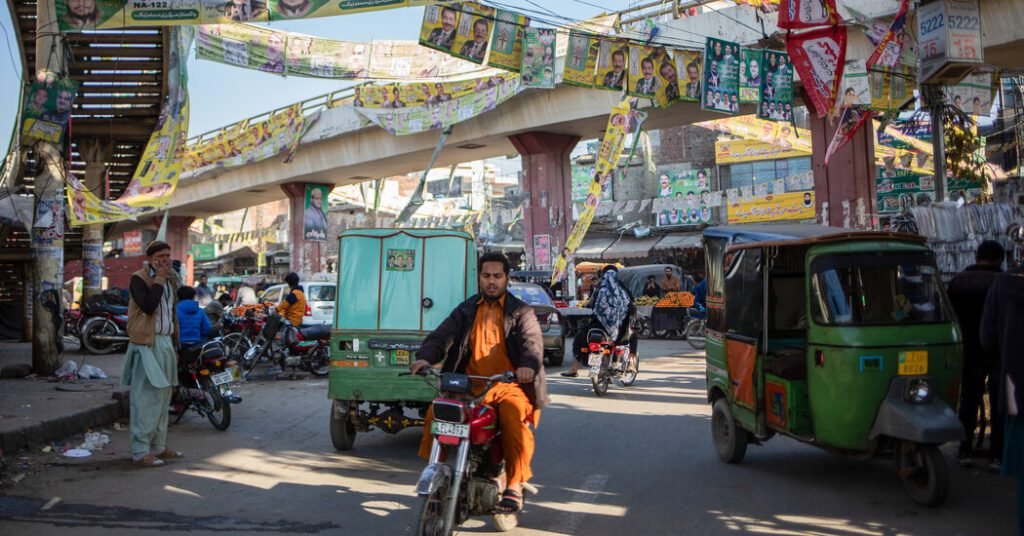Pakistani voters on Friday anxiously awaited the final results of national elections that have surprised many in the country by denying Pakistan’s powerful military a widely expected victory for its preferred party.
That party, led by former prime minister Nawaz Sharif, was trailing in the polls against a rival party led by another former prime minister, Imran Khan, as the totals stood a day after voting. Prolonged uncertainty and a tight race made it clear that the military, long the guiding hand in Pakistani politics, had failed in its hard-fought bid to wipe out Mr. Khan’s party ahead of the vote.
As of 10.30pm on Friday, that party, the Pakistan Tehreek-e-Insaf, or PTI, was leading the polls with at least 90 confirmed seats in the National Assembly, the lower house of parliament. Mr Sharif’s party had at least 66 confirmed seats, with only 29 up for grabs. Most of those seats were expected to go to candidates linked to Mr Sharif.
PTI’s success can be as disruptive as possible in a country where the military is the ultimate authority. It reflects the deep, loyal base of support Mr Khan has cultivated since he was ousted from Parliament in 2022, as well as his unique ability to outplay the military’s playbook to sideline politicians who have fallen out of favor.
In Punjab, the country’s most populous province, which accounts for more than half the seats in Parliament, many candidates in Mr. Sharif’s party, the Pakistan Muslim League-Nawaz, or PMLN, were at odds with those in Mr. Khan’s party, a popular figure who has been imprisoned for months. Other key PMLN leaders in Mr Sharif’s inner circle have lost ground in constituencies that were once party strongholds.
While Pakistan’s election commission had initially said results would be announced early Friday morning, by 6 p.m. officials had announced totals for just over half of the 266 seats available in the National Assembly.
The home ministry attributed the delay to a “lack of connectivity” related to security precautions. But human rights groups and analysts raised concerns it could be a sign of tampering by the military and warned it would raise questions about the legitimacy of the incoming government.
“This lack of transparency is deeply troubling,” the Human Rights Commission of Pakistan announced on the X platform. “We see no reasonable reason to attribute this delay to any extraordinary circumstances that may justify it.”
As the results trickled in, thousands of PTI supporters took to the streets in small towns across the country. They objected to the slow release of the results and made it clear that they will not accept any possible manipulation of the vote in favor of the PMLN.
“Any attempt to change the results overnight will be thwarted and will not be accepted at any cost by the people of Pakistan or by local and international observers and media,” PTI chairman Gohar Ali Khan told the X platform.
Despite trailing in the polls on Friday night, Mr Sharif appeared on the balcony of his office in Lahore around 7:30pm. to give a victory speech. Fireworks lit up the sky as he congratulated a crowd of supporters on their victory and called on all political parties to join him in forming a coalition government.
“We invite everyone today to rebuild this wounded Pakistan and sit with us,” he said. “Our agenda is all about a prosperous Pakistan.”
Voting on Thursday was marred by the suspension of cell phone service across the country. The home ministry attributed the shutdown to security concerns, while analysts said it was likely an attempt to prevent PTI supporters from mobilizing.
The election came after a months-long military-led campaign to oust Mr Khan and his party. PTI leaders and supporters were arrested en masse. The party was banned from using its iconic cricket bat symbol to identify its candidates on the ballot, a crucial visual cue for voters in a country with high illiteracy rates.
Mr Khan, a former cricket star turned populist politician, was arrested in August and given three prison terms for various offenses days before the vote. He has been barred from holding public office for a decade.
But these efforts to discourage his supporters – what many pundits described as “election fraud” – appeared to backfire. Many supporters feel a deep loyalty to the populist leader who they believe was unfairly ousted from the military and sympathize with Mr Khan’s plight.
Other voters said they were fed up with the military’s meddling in politics and voted for PTI candidates to malign the generals. Even more said they were disillusioned with the PMLN-led coalition government that came to power after Mr Khan was ousted and failed to deal effectively with the country’s rising inflation.
“This is much more of a public verdict against the military’s interference in politics, against the suppression of parties,” said Azeema Cheema, founding director of Verso Consulting, an Islamabad-based research firm. “The voter came out either angry, desperate or disappointed.
Salman Masood contributed to the report.

